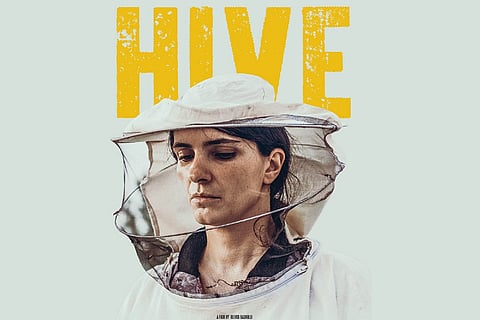Of bee stings and honey: Hive tells the story of women who survived Kosovo war
In an angry outburst against her mother, young Zana yells, ‘that’s right, you never cry’. Fahrije had just taken out her missing husband’s bench saw to sell it so that she could start a business to run the family. The daughter, pained to see her father’s belongings being given away, lashes out at the mother, calling her names till it all ends in a slap and a broken photo. It is one of the many captivating visuals of Hive, an Albanian-Kosovan film, based on a real life story, screened at the ongoing International Film Festival of Kerala (IFFK).
It is hard to believe that the film tells a story from the late 90s. In Kosovo, a partially recognised state in South East Europe, where a war had ended, women – war widows and wives of missing men – are not expected to drive on their own, or work in the city. Before you begin to think of the casualties of war and what it does to human lives across the world, you look for signs which can tell you why the women in this Kosovan village had to put up with it in the first place. There are no obvious signs of patriarchy or oppression that you are used to. Women seem to move about freely, have conversations, and in the case of the lead character Fahrije, dangerously work with bees for honey extraction.
For someone who is not familiar with the situation, a meeting of the women and the problems they raise appear too incredible, coming from this part of the world and this period in time – it is already seven years past the war. What will the others say if they learn to drive and get a licence, a woman asks. They have gathered at the office of a women’s organisation to discuss their money troubles. The men have all been gone for years – killed or missing after the war when Serbian troops had barged in and removed them from the families. The women had been struggling to make ends meet with the little they got from the organisation.
Fahrije – played by Yllka Gashi – takes the first step, and learns to drive a truck. She has been selling honey through her aged and weak father-in-law, wheeled to the market every morning with the jars. She could not sell it herself, you realise later, as you watch the reactions of the villagers giving her scornful looks and muttering curses when they see her drive. Only an older woman – an adorable rebel – comes to support her initially.
Watch: Trailer of Hive
It takes time to understand what’s taboo and what’s not. It was fine when Fahrije worked with the bees and came back with stings as long as it was her father-in-law, a man, who sold the bottles of honey. The moment she tries to run the business on her own, preparing jars of avjars (pepper sauce) and making a deal with the local supermarket to sell it, men are angry.
But Fahrije takes every obstacle with the same impassive face, only a soft bulge of the cheekbones letting you know how disturbing it all is. She has no time to sit and worry. When someone breaks a window of her car, she simply tapes a screen over it and moves on.
The film moves with Fahrije as an axis. The screen feels warm when one by one, other women join her business and create avjars together, an organic workforce led by Fahrije. Their sisterhood comes out beautifully in an upsetting scene, when scores of bottles they put together are smashed by unknown men. The women simply walk in with their brooms, clean up the mess and move on. It is like an extension of the scene in which Fahrije taped a screen over her broken car window.
It was also endearing to watch the scene where the women finally have a moment of celebration, allowing themselves to enjoy their little successes and dance in joy. In their middle sits the once rebellious daughter, coming around as children do, realising what her mother went through as she begins to grow up. For her sake, you wish Fahrije could open up to the children sometimes, as she does in a bathroom scene with the girl.
You see her pain only in recurring dreams of a drowning man – her missing husband – until she breaks down and sobs loudly in the shower. The father-in-law, who was initially unsupportive of her business, too has a change of heart apparently realising that it is best for the children, and the two begin to bond over their love for the missing man.
The film was the debut of director Blerta Basholli, who was a teenager when the war broke out in Kosovo. She adds inspiring footage of the real Fahrije at the end of the film, making you want to reach out to this woman who never gave up or lost hope. In a Guardian interview, Basholli says that she wanted to make the film when she heard Fahrije say that she is still waiting for the missing husband, in the hope that he is alive and would come back. But she never backed down from doing what she thought best in the circumstances.

